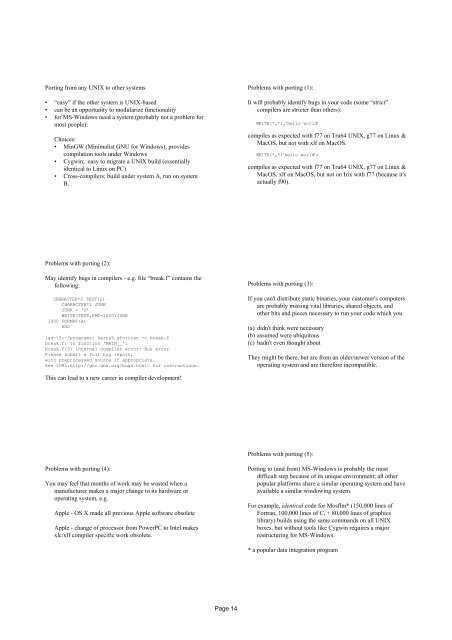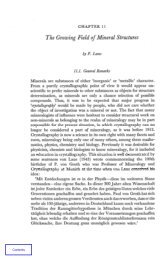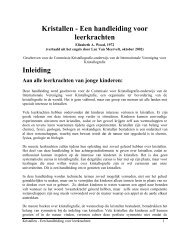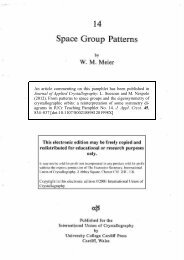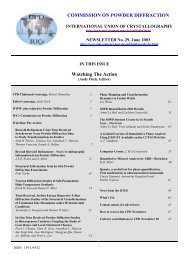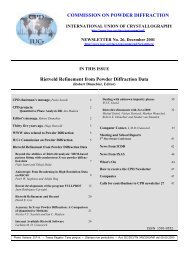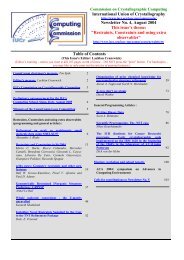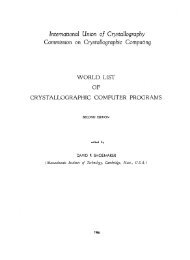Table of Contents (page 1 of 2) International Union of ...
Table of Contents (page 1 of 2) International Union of ...
Table of Contents (page 1 of 2) International Union of ...
Create successful ePaper yourself
Turn your PDF publications into a flip-book with our unique Google optimized e-Paper software.
Porting from any UNIX to other systems<br />
• “easy” if the other system is UNIX-based<br />
• can be an opportunity to modularize functionality<br />
• for MS-Windows need a system (probably not a problem for<br />
most people):<br />
Choices:<br />
• MinGW (Minimalist GNU for Windows), provides<br />
compilation tools under Windows<br />
• Cygwin; easy to migrate a UNIX build (essentially<br />
identical to Linux on PC)<br />
• Cross-compilers; build under system A, run on system<br />
B.<br />
Problems with porting (1):<br />
It will probably identify bugs in your code (some “strict”<br />
compilers are stricter than others):<br />
WRITE(*,*),’hello world’<br />
compiles as expected with f77 on Tru64 UNIX, g77 on Linux &<br />
MacOS, but not with xlf on MacOS.<br />
WRITE(*,*)’hello world’;<br />
compiles as expected with f77 on Tru64 UNIX, g77 on Linux &<br />
MacOS, xlf on MacOS, but not on Irix with f77 (because it's<br />
actually f90).<br />
Problems with porting (2):<br />
May identify bugs in compilers - e.g. file “break.f” contains the<br />
following:<br />
CHARACTER*2 TEST(2)<br />
CHARACTER*1 JUNK<br />
JUNK = 'O'<br />
WRITE(TEST,FMT=1000)JUNK<br />
1000 FORMAT(A)<br />
END<br />
[g4-15:~/programs] harry% gfortran -c break.f<br />
break.f: In function 'MAIN__':<br />
break.f:3: internal compiler error: Bus error<br />
Please submit a full bug report,<br />
with preprocessed source if appropriate.<br />
See for instructions.<br />
Problems with porting (3):<br />
If you can't distribute static binaries, your customer's computers<br />
are probably missing vital libraries, shared objects, and<br />
other bits and pieces necessary to run your code which you<br />
(a) didn't think were necessary<br />
(b) assumed were ubiquitous<br />
(c) hadn't even thought about<br />
They might be there, but are from an older/newer version <strong>of</strong> the<br />
operating system and are therefore incompatible.<br />
This can lead to a new career in compiler development!<br />
Problems with porting (5):<br />
Problems with porting (4):<br />
You may feel that months <strong>of</strong> work may be wasted when a<br />
manufacturer makes a major change to its hardware or<br />
operating system, e.g.<br />
Apple - OS X made all previous Apple s<strong>of</strong>tware obsolete<br />
Apple - change <strong>of</strong> processor from PowerPC to Intel makes<br />
xlc/xlf compiler specific work obsolete.<br />
Porting to (and from) MS-Windows is probably the most<br />
difficult step because <strong>of</strong> its unique environment; all other<br />
popular platforms share a similar operating system and have<br />
available a similar windowing system.<br />
For example, identical code for Mosflm* (150,000 lines <strong>of</strong><br />
Fortran, 100,000 lines <strong>of</strong> C, + 80,000 lines <strong>of</strong> graphics<br />
library) builds using the same commands on all UNIX<br />
boxes, but without tools like Cygwin requires a major<br />
restructuring for MS-Windows.<br />
* a popular data integration program<br />
Page 14


